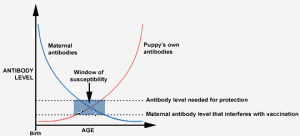Let’s first take a moment to discuss immunity and vaccines in general, and then offer some guidelines specific to your cat or dog.
Common questions and statements I hear in practice regarding SHOTS sound something like this: What are vaccines for? Are they necessary? I’ve heard ‘shots’ might be harmful to my pet, why should I give them? I’m taking a holistic/natural approach to my pet’s healthcare, so I don’t believe in vaccines… and the list goes on and on.
So, boiled down, why does your pet need vaccines? Let’s talk briefly about immunity; where it comes from and how it works.
Hopefully, your new pet had ample time with his or her mother for their first seven to eight weeks of life, and most especially in the first 12-24 hours after they were born. During that first half-day of life, vital antibodies- those things that provide immunity to disease- are transferred to the young via mother’s milk in a protein rich substance called colostrum. In these precious few hours, the infant digestive tract is open to receiving the large proteins naturally provided. After this time, the mother may still secrete antibodies in the milk for roughly 72 hours, but the pup or kitten will not absorb them as readily because the body will start to recognise the large proteins as foreign. Also, keep in mind that mama can only provide immunity for disease she has had exposure to, either in the form of the disease itself, or preferably in the form of prior vaccines when she was a baby and young adult.
Great! My pet had the best mama in the world! She was vaccinated! My questions are answered! No vaccines necessary!
Not so fast, friend. Those wonderful molecules given for the first 12 hours or so after birth slowly break down and dissipate in a young animal’s body. They only last an average of six to twelve weeks. We don’t know the exact time they will disappear, we just know that they will. Timing is different for every animal based on what the mother’s immunity level was prior to birth and how well the pup or kitten nursed immediately after. Immunity levels cycle like this…
Okay, what the heck do those lines mean, and how are they relative to my pet’s health?
It’s fairly simple, really. As mentioned, passive immunity from mother is going to decline as a young animal matures, and somewhere in that Blue Box period is our window of opportunity to build a functional immune system that will provide protection from disease for your pet as it grows. Because immunity typically starts to decline around 6 weeks of age, the present recommendation is to vaccinate a puppy three to four times, at three week intervals. For kittens it’s a bit different, they tend to have a faster decline and and then rise of immunity, so we recommend at least three vaccines through the 6-12 week age period.
But why so many vaccines? Four sets? Three sets? Why?
In order for your pet to have adequate protection as a maturing dog or cat, the immune system must have at least two exposures to a vaccine when maternal antibodies are low enough not to interfere with the vaccine. The first begins to stimulate the pets own system to start production of antibodies, the second reinforces the immune response. Again, we can’t be exactly sure when maternal antibodies disappear, so we have to work toward two adequate response cycles in that Blue Box period of time. Years and years of medical research has isolated this time period to be the most successful to provide the desired immunity to common diseases.
Inevitably at this point in the discussion, a question arises. If Mother Nature constructed this wonderful design of maternal antibodies and temporary protection against disease, what happens to animals that are never vaccinated? Sadly, many die due to exposure to an illness such as Parvovirus, or Distemper. If able to survive the disease they could be considered ‘naturally’ immunised. The goal of your veterinarian is to provide safe exposure to disease molecules that will stimulate the body to provide immunity without inducing illness.
Okay Doc, I get it. Vaccines are important. What should I do now to make sure my pet is protected?

